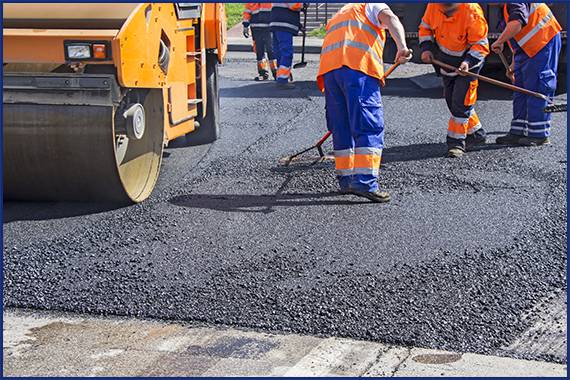High-Quality Paving Options for Homeowners
Exploring the Numerous Sorts Of Asphalt Paving and Their Benefits
The landscape of asphalt paving includes a variety of types, each engineered to resolve details needs and environmental factors to consider. From the robust features of Hot Mix Asphalt to the green characteristics of Recycled Asphalt Pavement, understanding these alternatives can significantly influence task outcomes. Additionally, technologies such as Cozy Mix Asphalt and Porous Asphalt present added layers of efficiency and sustainability. As we discover these various paving remedies, the nuanced benefits they use might shock you and potentially change your strategy to future paving tasks.
Hot Mix Asphalt
When considering one of the most reliable paving solutions, warm mix asphalt (HMA) stands apart as a premier selection for several applications (paving service). HMA is a functional leading material recognized for its longevity, flexibility, and overall performance. It is generated by heating asphalt binder and integrating it with aggregates at high temperatures, guaranteeing a consistent blend that can endure various environmental problems
One of the main advantages of HMA is its capability to offer a smooth, skid-resistant surface, improving safety for cars and pedestrians alike. Additionally, HMA exhibits excellent resistance to contortion, making it optimal for high-traffic locations such as highways and parking lots. Its flexibility to various environments even more adds to its prevalent usage.
The setup procedure of HMA is reasonably fast, permitting effective job completion with very little disruption to traffic. Additionally, it can be recycled, lowering waste and advertising sustainability within the building industry. In general, hot mix asphalt remains a top choice for leading experts due to its durable performance attributes and lasting cost-effectiveness, making it a reliable solution for various facilities requirements
Warm Mix Asphalt
Warm mix asphalt (WMA) supplies an innovative choice to warm mix asphalt, offering similar benefits while needing reduced manufacturing temperatures. Commonly created at temperatures between 190 ° F and 250 ° F, WMA technology lowers energy usage and greenhouse gas discharges during production, making it a much more eco-friendly option.
This adaptability can lead to improved compaction and overall durability of the asphalt surface area. Furthermore, WMA can be made use of in different applications, ranging from highways to domestic driveways, without endangering performance.

The consolidation of ingredients or modified binders in WMA adds to its enhanced buildings, ensuring that it satisfies or exceeds performance standards. WMA's decreased thermal impact during production can lower the possibility of damage to the surrounding environment, making it an appealing selection for lasting paving techniques.
Cold Mix Asphalt
Cold mix asphalt is a versatile leading remedy frequently utilized for temporary repair services and low-traffic locations. This kind of asphalt is produced at ambient temperature levels, making it a convenient selection for fast repairs and jobs where standard hot mix asphalt might not be practical. The mix commonly includes asphalt binder, aggregate, and ingredients, allowing it to remain convenient for Get More Information an extensive period.
One of the key advantages of cold mix asphalt is its convenience of application. It can be installed without customized equipment, making it easily accessible for smaller sized contractors and do it yourself enthusiasts. Additionally, cool mix can be used in different weather problems, which is especially advantageous for urgent repair service requirements.

It might not offer the very same lasting longevity as hot mix asphalt, its quick application and flexibility make it an outstanding choice for short-lived solutions and low-traffic applications. Generally, cold mix asphalt stays a sensible alternative in the asphalt paving landscape.
(try here)
Permeable Asphalt
Permeable asphalt is an innovative paving solution created to boost stormwater administration and decrease surface area runoff. This kind of asphalt includes an unique framework that incorporates interconnected gaps, allowing water to penetrate with the surface area and into the underlying layers. By assisting in natural water drainage, permeable asphalt helps reduce the threat of flooding and decreases the problem on metropolitan stormwater systems.
One of the main advantages of permeable asphalt is its capacity to enhance water quality. As stormwater filters via the pavement, contaminants and debris are trapped, decreasing the variety of impurities that go into local waterways. This contributes to much healthier ecosystems and supports conformity with ecological policies.
Furthermore, permeable asphalt can enhance the long life of the pavement itself. By reducing water build-up externally, it lessens the capacity for freeze-thaw cycles that can lead to cracking and wear and tear. In addition, the reduced demand for traditional stormwater management framework can result in cost financial savings for districts and designers.
Recycled Asphalt Pavement
(take action)Recycled asphalt sidewalk (RAP) stands for a lasting method to roadway building and construction and maintenance that benefits both the setting and the economic situation. By recycling existing asphalt products, RAP minimizes the need for brand-new raw materials, which in turn conserves natural deposits and decreases ecological influence. This method decreases power usage and greenhouse gas emissions connected with the production of brand-new asphalt.
The unification of RAP into new pavement combinations can also result in significant cost savings. Specialists can take advantage of recycled materials to lower total task expenses, making it a financially feasible option for districts and exclusive programmers alike. Furthermore, RAP uses comparable performance characteristics to virgin asphalt, making sure durability and durability in roadway surfaces.
RAP's flexibility permits it to be utilized in various applications, including freeways, car parking great deals, and property driveways. By improving the architectural honesty of existing sidewalks, RAP adds to boosted safety and security and level of smoothness of highways.
Conclusion
Hot Mix Asphalt succeeds in resilience and fast setup for high-traffic locations, while Cozy Mix Asphalt enhances sustainability through decreased power usage. Cold Mix Asphalt offers as an economical choice for urgent repair services, Porous Asphalt properly manages stormwater, and Recycled Asphalt Sidewalk promotes ecological duty.